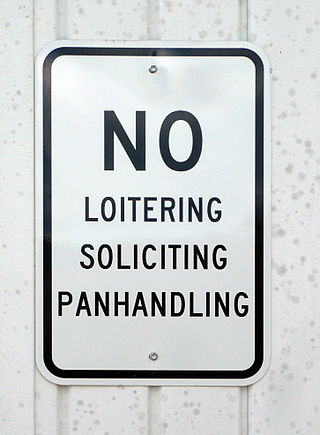Related Research Articles

A bookmaker, bookie, or turf accountant is an organization or a person that accepts and pays out bets on sporting and other events at agreed-upon odds.
Upskirting or upskirt photography is the practice of taking photographs or videos under a person's skirt or kilt, capturing an image or video of the crotch area, underwear/panties, and sometimes genitalia. An "upskirt" is a photograph, video, or illustration which incorporates such an image, although the term may also be used to refer to the area of the body inside a skirt, usually from below and while being worn.

Freedom of religion in Pakistan is formally guaranteed by the Constitution of Pakistan for individuals of various religions and religious sects.

The Hudud Ordinances are laws in Pakistan enacted in 1979 as part of the Islamization of Pakistan by Muhammad Zia-ul-Haq, the sixth president of Pakistan. It replaced parts of the British-era Pakistan Penal Code, adding new criminal offences of adultery and fornication, and new punishments of whipping, amputation, and stoning to death. After much controversy and criticism parts of the law were extensively revised in 2006 by the Women's Protection Bill.

Cruelty to animals, also called animal abuse, animal neglect or animal cruelty, is the infliction of suffering or harm by humans upon animals, either by omission (neglect) or by commission. More narrowly, it can be the causing of harm or suffering for specific achievements, such as killing animals for entertainment; cruelty to animals sometimes encompasses inflicting harm or suffering as an end in itself, referred to as zoosadism. Divergent approaches to laws concerning animal cruelty occur in different jurisdictions throughout the world. For example, some laws govern methods of killing animals for food, clothing, or other products, and other laws concern the keeping of animals for entertainment, education, research, or pets. There are several conceptual approaches to the issue of cruelty to animals.
Online casinos, also known as virtual casinos or Internet casinos, are online versions of traditional casinos. Online casinos enable gamblers to play and wager on casino games through the Internet. It is a prolific form of online gambling.
Public intoxication, also known as "drunk and disorderly" and "drunk in public", is a summary offense in some countries rated to public cases or displays of drunkenness. Public intoxication laws vary widely by jurisdiction, but usually require an obvious display of intoxicated incompetence or behavior which disrupts public order before the charge is levied.
The standard scale is a system in Commonwealth law whereby financial criminal penalties (fines) in legislation have maximum levels set against a standard scale. Then, when inflation makes it necessary to increase the levels of the fines the legislators need to modify only the scale rather than every individual piece of legislation.
The Pakistan Penal Code, abbreviated as PPC, is a penal code for all offences charged in Pakistan. It was originally prepared by Lord Macaulay with a great consultation in 1860 on behalf of the Government of British India as the Indian Penal Code. After the creation of Pakistan in 1947, Pakistan inherited the same code and subsequently after several amendments by different governments, in Pakistan it is now a mixture of Islamic and English Law. Presently, the Pakistan Penal Code is still in effect and can be amended by the Parliament of Pakistan.
Anti-terrorism legislation are laws aimed at fighting terrorism. They usually, if not always, follow specific bombings or assassinations. Anti-terrorism legislation usually includes specific amendments allowing the state to bypass its own legislation when fighting terrorism-related crimes, under alleged grounds of necessity.
The legal age of consent for sexual activity varies by jurisdiction across Asia. The specific activity engaged in or the gender of participants can also be relevant factors. Below is a discussion of the various laws dealing with this subject. The highlighted age refers to an age at or above which an individual can engage in unfettered sexual relations with another who is also at or above that age. Other variables, such as homosexual relations or close in age exceptions, may exist, and are noted when relevant.

Loitering is the act of standing or waiting around idly without apparent purpose in some public places.
The Women's Protection Bill which was passed by the National Assembly of Pakistan on 15 November 2006 is an attempt to amend the heavily criticised 1979 Hudood Ordinance laws which govern the punishment for rape and adultery in Pakistan. Critics of the Hudood Ordinance alleged that it made it exceptionally difficult and dangerous to prove an allegation of rape, and thousands of women had been imprisoned as a result of the bill. The bill returned a number of offences from the Zina Ordinance to the Pakistan Penal Code, where they had been before 1979, and created an entirely new set of procedures governing the prosecution of the offences of adultery and fornication. Whipping and amputation were removed as punishments. The law meant women would not be jailed if they were unable to prove rape and their complaints of rape would not be seen as confession of adultery.
Gambling in India varies by state; states in India are entitled to formulate their own laws for gambling activities. Some states like Goa have legalised casinos. Common gambling activities like organized betting are restricted except for selective categories including lottery and horse racing.

The Gambling Commission is an executive, non-departmental public body of the Government of the United Kingdom responsible for regulating gambling and supervising gaming law in Great Britain. Its remit covers arcades, betting, bingo, casinos, slot machines and lotteries, as well as remote gambling, but not spread betting. Free prize competitions and draws are free of the Commission's control under the "Gambling Act 2005".
Laws regarding incest vary considerably between jurisdictions, and depend on the type of sexual activity and the nature of the family relationship of the parties involved, as well as the age and sex of the parties. Besides legal prohibitions, at least some forms of incest are also socially taboo or frowned upon in most cultures around the world.

Litter in the United States is an environmental issue and littering is often a criminal offense, punishable with a fine as set out by statutes in many places. Litter laws, enforcement efforts, and court prosecutions are used to help curtail littering. All three are part of a "comprehensive response to environmental violators", write Epstein and Hammett, researchers for the United States Department of Justice. Littering and dumping laws, found in all fifty United States, appear to take precedence over municipal ordinances in controlling violations and act as public safety, not aesthetic measures. Similar from state-to-state, these laws define who violators are, the type or "function" of the person committing the action, and what items must be littered or dumped to constitute an illegal act. Municipal ordinances and state statutes require a "human action" in committing illegal littering or dumping, for one to be "held in violation." Most states require law enforcement officers or designated, authorized individuals, to "...witness the illegal act to write a citation." Together, prosecutions and punitive fines are important in fighting illegal littering and dumping.

In traffic laws, a hit and run or a hit-and-run is the criminal act of causing a traffic collision and not stopping afterwards. It is considered a supplemental crime in most jurisdictions.
The concept of probation was introduced to Pakistan, then part of British India, in 1923. This initial system amounted to binding over some first-time offenders, without supervision by probation staff, and applied chiefly to young offenders. Reforms and extension to adult offenders were considered but not implemented under British rule, although a form of "probational release" or parole from longer prison sentences was introduced in the then province of Punjab in 1926.
The legislative assembly of Pakistan has enacted several measures designed to give women more power in the areas of family, inheritance, revenue, civil, and criminal laws. These measures are an attempt to safeguard women's rights to freedom of speech and expression without gender discrimination. These measures are enacted keeping in mind the principles described by the Quran.
References
- ↑ Riaz, Haroon (30 January 2016). "Why Pakistan should legalise gambling". The Nation. Retrieved 19 April 2020.
- 1 2 3 4 5 6 7 8 "The Prevention of Gambling Act, 1977" (PDF). National Assembly of Pakistan. 25 May 1977. Retrieved 19 April 2020.
- ↑ Simon. "Simon's Guide to Pakistan Gambling & Online Betting Sites - Simon's Online Casino Gambling Blog" . Retrieved 2023-10-02.